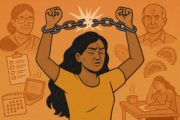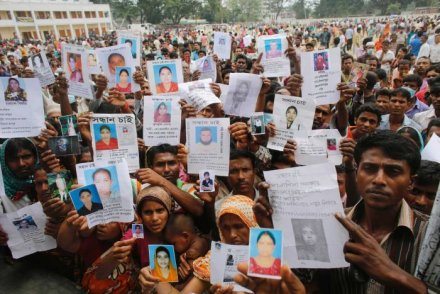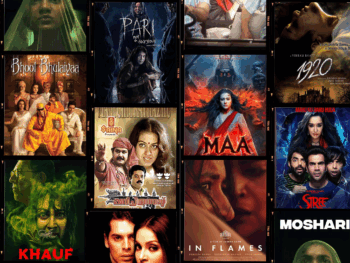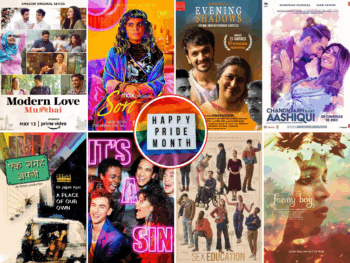On a recent shopping trip, I spotted a sundress in a big-chain retail store. It was cute, trendy and…only $15. And then I did something out of the ordinary – I looked at the label. “Made In Bangladesh,” it read. My conscience immediately became heavily burdened. Was this ‘cheap chic’ dress manufactured in the Rana Plaza?
On April 24, the Rana Plaza building, home to five garment factories, collapsed outside Dhaka, Bangladesh. Amongst the wreckage, clothing from popular retailers, including Canadian label Joe Fresh, was found. The death toll has reached over 1,100 people, making it the worst industrial accident since the 1984 Union Carbide gas leak in Bhopal, India. The collapse occurred a day after an engineer deemed Rana Plaza structurally unsafe and warned the building’s owner to evacuate.
The tragedy has given an entirely new definition to the term ‘fashion victim’. A conversation has begun concerning the high human price paid by Bangladeshi workers who churn out fast fashion at a low cost for some of the biggest fashion brands in the world. Global consumers are wondering whether it’s time they place ethics ahead of affordable fashion.
Since the disaster, pressures have become exceedingly high on fashion labels that, until now have turned a blind eye to the working conditions in Bangladesh, to take action. In response, several international fashion retailers have signed the Accord on Fire and Building Safety, a legally binding contract that calls for independent safety inspections and states that retailers must stop conducting business with garment factories that refuse to comply with safety improvements.
The Accord, while far-reaching, is a step in the right direction. It represents a new industry standard and some believe it’s the single best method for legally guaranteeing the safety of garment workers in Bangladesh.
Companies that have signed the Accord include Swedish retailer H&M (the single largest producer of apparel in Bangladesh), Loblaw Companies, which markets Joe Fresh, and Inditex, which owns Zara. To date, Wal-Mart and the Gap have not signed the Accord.
Earlier this month, SumOfUs.org, a global consumer watchdog, in collaboration with the Bangladesh Center for Worker Solidarity penned a letter to Diane Von Furstenberg, urging her to use her status as a design partner for the Gap to pressure the company to sign the Accord. Von Furstenberg has previously been an outspoken advocate on the ethical obligations of the fashion industry to protect workers in Bangladesh, making her design partnership with the Gap increasingly controversial.

In addition to the Accord, Bangladesh’s government will allow the country’s 4 million garment workers to form trade unions without the permission of factory owners. The government has also announced their plan to raise the minimum wage of garment workers in Bangladesh (which is the world’s lowest at approximately $38/month).
These new laws, if properly enforced, could do a lot to improve labour and safety standards in Bangladesh. Yet, they still don’t let global consumers off the hook. At a time when ethical fashion appears to be an oxymoron, will consumers be forced to give up fast fashion for ethics?
Not necessarily. In her Globe & Mail article ‘Cheap clothes have helped fuel social revolution in Bangladesh.’ Stephanie Nolen argues that fast fashion in the Western world has “helped fuel a social and economic revolution in Bangladesh, and Bangladeshis do not want that to end.” Instead, she suggests consumers demand answers from fashion labels:
“…demand that they audit their producers for safety and for working conditions. You can demand to know what their producers’ relations are with Bangladesh’s struggling labour unions. You can tell [the fashion label] that if they are going after your business, they need to have a direct relationship with a supplier – not outsource to a third party so they get plausible deniability. Demand to see those safety audits, every quarter, posted on their website, right beside the sale on $6 shorts.”
As Bangladesh continues to clean up the rubble that was once Rana Plaza, perhaps its time we, as consumers, find a little more room for ethics in our closets.
PHOTOS COURTESY OF DAVID GOLDMAN/ASSOCIATED PRESS; REUTERS
http://www.nytimes.com/2013/02/10/books/review/overdressed-by-elizabeth-l-cline.html?_r=0
http://www.npr.org/2013/05/01/180304715/the-real-costs-of-cheap-fashion
http://anokhimedia.com/magazine/fashion-scoop
http://anokhimedia.com/magazine/designer-profile-bibhu-mohapatra
http://sumofus.org/
sheetal Nanda
Author
Sheetal Maya Nanda is the Principal Lawyer at SN Legal (www.snlegal.ca) and a Freelance Writer. She enjoys dissecting the legal issues happening in the entertainment and sports industries from a social, political and cultural lens. Outside the office, Sheetal is a...


















































































































